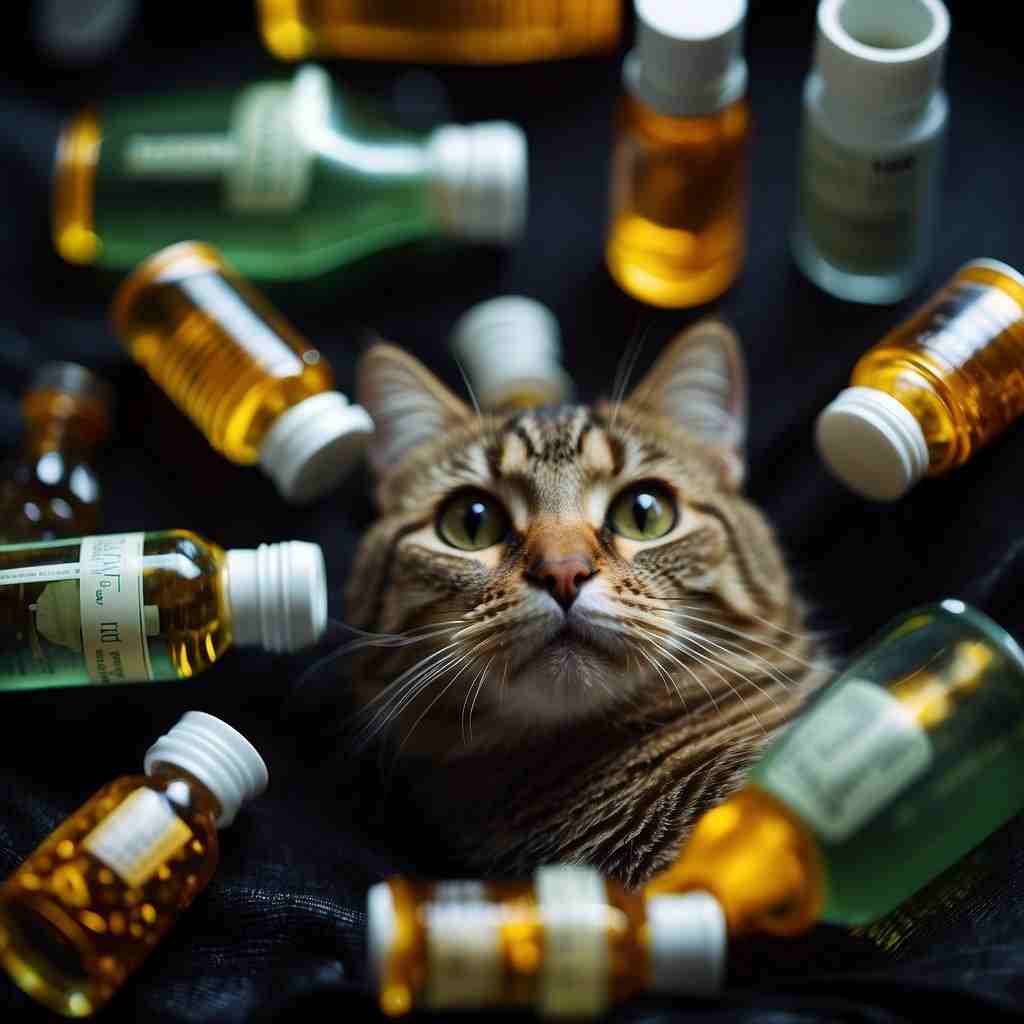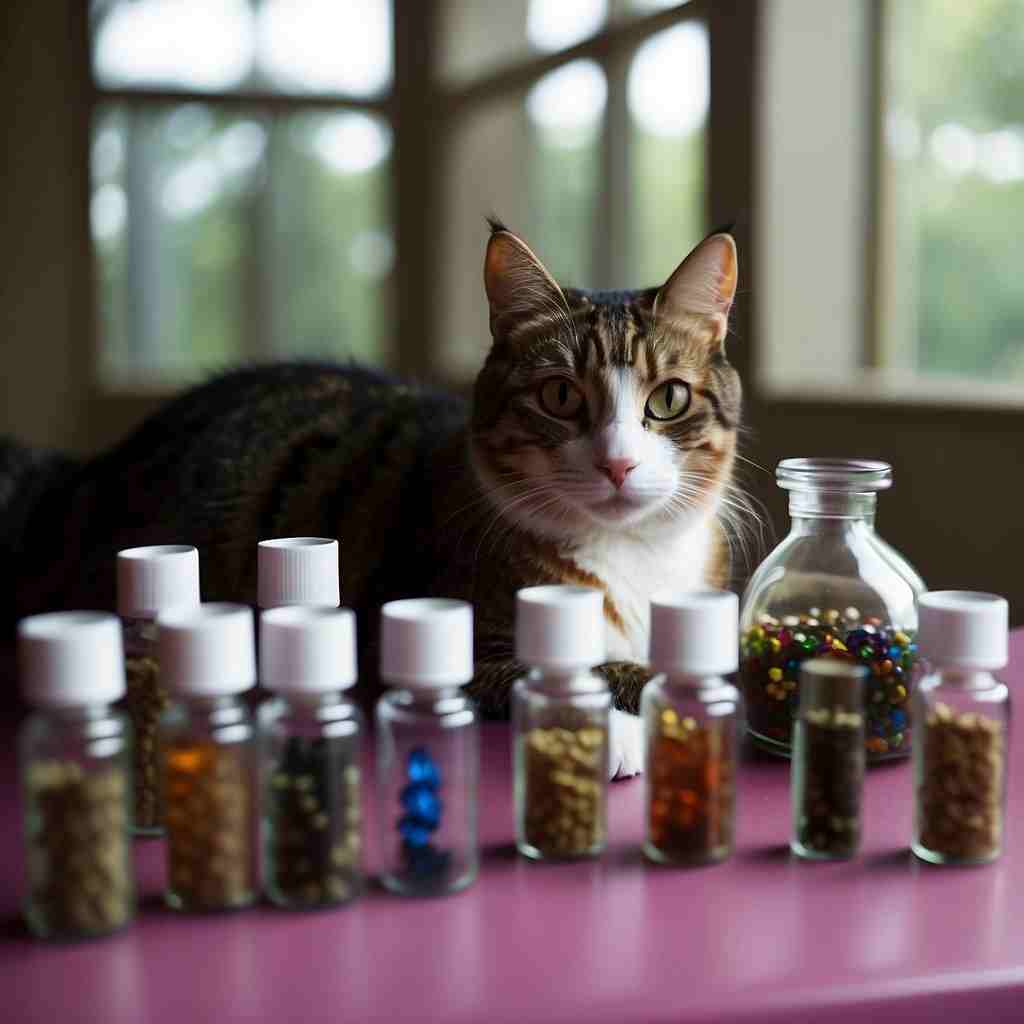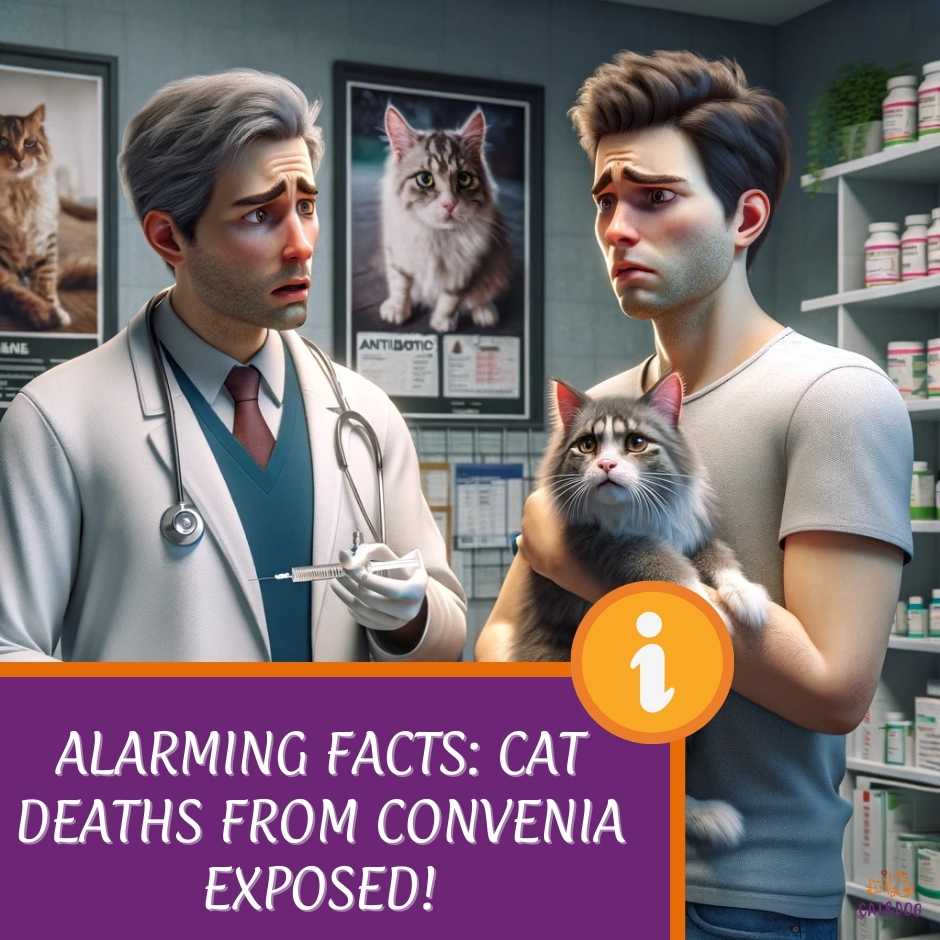Convenia is an antibiotic injection used in cats to treat bacterial infections. It works by targeting and killing bacteria in the body. (1)
However, there have been reports of severe adverse reactions and deaths associated with Convenia use in cats, so caution and proper veterinary supervision are advised.
Convenia, a long-acting injectable antibiotic, is a common treatment prescribed by vets for our feline friends battling various bacterial infections.
Its convenience has made it a popular choice, as a single injection can provide up to two weeks of treatment with peak blood levels visible within 2 hours in felines.
However, there have been reports of cat deaths from Convenia, making it crucial for cat owners to understand the risks and precautions associated with this medication, especially in Australian cats.
According to Dr. Pete Wedderburn, Convenia is a Third-generation cephalosporin Antibiotic, similar in structure to penicillin, and it is safest to use if your cat only requires a full 14-day course of oral antibiotics.
The antibiotic is generally absorbed into the stream from the injection site within hours, generating excessive levels in the bloodstream which last for 2 weeks.
Some common side effects of Convenia include vomiting, nausea, diarrhea, dizziness, loss of appetite, and muscle pain.
It is important for cat owners to be aware of these potential side effects and to consult with their veterinarian if they notice any concerning symptoms in their cat.

You’re probably seeking peace of mind regarding the treatment options for your cat.
It’s distressing to come across stories of Convenia potentially leading to serious side effects, including death, in some cats, especially older cats, and feral cats.
These incidents have sparked discussions, debates, and a deep dive among cat owners and vets alike about the risks associated with Convenia as a safe drug.
If you are concerned about the potential side effects of Convenia for your old cat, it is important to consult with an emergency vet at your local vet’s office for proper treatment and care. Good luck!
The aim here is to walk you through an objective journey where we’ll unpack the use of Convenia, balance the serious adverse reactions against its benefits, and consider personal anecdotes alongside veterinary insights.
By the end, we hope to arm you with the information you need to make informed choices about your cat’s health care, ensuring you’re up-to-date on all aspects of this controversial antibiotic, and most importantly, that your beloved furball stays safe and sound with the use of safer options.
Key Takeaways
- Convenia is a long-acting antibiotic for cats that has raised safety concerns due to the serious side effects reported.
- The article analyzes the risks of Convenia, alongside its benefits and alternative treatments, using expert opinions and data.
- A well-informed decision on using Convenia for your cat is vital, considering the potential risks and your cat’s specific health needs.
Serious Adverse Reactions and Cat Deaths From Convenia Reported
Documented Fatalities
It’s rare, but there have been instances where cats have unfortunately passed away after receiving Convenia. Some vet reports have made this correlation, which is something to pay attention to if you’re a cat parent.
Type of Reactions Leading to Deaths
Now, what kind of scary stuff are we talking about? Allergic reactions are the usual suspects, and sometimes they can lead to more severe complications like organ failure. Imagine a tiny sneeze turning into a big problem – yikes!
- Allergic Reactions: Swelling, itchiness, trouble breathing (2)
- Organ Failure: Liver damage, bone marrow suppression (3)
Fun Fact: Did you know cats are often more sensitive to medications than other pets? That’s why it’s super important to keep an eye on them after any treatment.
Frequency of Adverse Reactions
Here’s the deal: Not every kitty that gets Convenia will have problems – but a small number might. Think of it like playing cat and mouse with potential side effects.
Risk Comparison
I bet you’re wondering, “Is Convenia riskier than other antibiotics for my cat?” Well, let’s put it this way: just like picking a new treat for them, it’s all about weighing the risks and benefits.
In short, stay informed, ask your vet the hard questions, and always keep your kitty’s health as the top priority!
Personal Stories and Veterinary Perspectives
Real-Life Incidents:
We’ve seen numerous online forums where cat owners share their harrowing experiences with Convenia.
Take, for example, a heartbroken pet parent: their cat was given Convenia along with an anti-inflammatory, and sadly, passed away not long after due to complications from renal failure, likely due to underlying kidney disease and liver disease.
This isn’t an isolated incident—several other stories are echoing this experience, highlighting the importance of monitoring and conducting blood work when administering medications, especially for cats with pre-existing conditions such as anemia.
Can you imagine the emotional toll it takes? As Cornell College of Veterinary Medicine reports, 53% of cats by the age of 15 have some form of degenerative kidney disease, making it a common and potentially dangerous condition to consider when administering medications like Convenia.
Case Study Example:
- Cat’s Name: Bella
- Health History: Generally healthy, occasional UTI
- Reason for Convenia: Bacterial infection (5)
- Reaction: Deteriorated health post-injection
- Outcome: Passed away within weeks
Expert Opinions:
On the flip side, many veterinarians advocate for Convenia’s effectiveness in treating bacterial infections, including UTIs, but pet owners need to understand the risks and precautions associated with this medication.
In reality, it’s not about pointing fingers but understanding the medicine’s impact on underlying diseases.
“Antibiotics like Convenia are powerful tools, but each cat responds differently,” shares a vet and pet owner from a reputable clinic.
“The key is close monitoring and weighing risks versus benefits, especially when it comes to potential side effects such as changes in urine behavior and the use of ultrasound to assess bladder health and potential bladder infection.
It is also important to consider the impact on the immune system, as over 70% of the immune system is located in the gut and antibiotics can kill both good and bad bacteria.”
- Safety Measures: Always report adverse reactions.
- Consider your cat’s health history.
- Discuss all medication options.
- Stay informed about potential side effects.
Why do these stories matter? They remind us that while Convenia might be a convenient option, vigilance is crucial.
Let’s advocate for our kitty pals by staying informed and always consulting with our trusted vets. Have you had a similar experience? Your story could help another worried cat owner navigate these tough decisions.
Comparative Risk Analysis
You know, Convenia (cefovecin sodium) is like that long-term houseguest—it hangs around for a while, giving its antibiotic benefits long after a single injection.
But what about the risks? Some cats have had adverse reactions to Convenia, ringing alarm bells for some pet parents. You might wonder, how risky is it? Let’s break it down:
Table 1: Antibiotics for Cats – Risk Comparison
| Antibiotic | Common Side Effects | Severity in High-Risk Cats | Duration of Action |
| Convenia | Allergic reactions; Less commonly, severe reactions | Possibly higher risk for adverse effects | Longer-lasting (up to 14 days) |
| Amoxicillin | Mild gastrointestinal symptoms; Allergic reactions | Lower risk profile | Short-term action |
| Doxycycline | Gastrointestinal upset; Dental discoloration in kittens | Medium risk; Avoid in young cats | Short to medium-term action |
Looking for safer alternatives for high-risk cats? Here’s what you might consider:
- Amoxicillin: The good ol’ reliable, with a mild side effect profile, especially for cats with sensitivities. (6)
- Probiotic therapies: These can support gut health, which is essential when any antibiotic enters the scene. (7)
Remember, if your kitty’s on Convenia and you spot something off, don’t play the guessing game. A trip to the vet can clear up concerns.
While every med has its place, it’s about finding the right fit for your feline. Stay informed, ask questions, and here’s to happy, healthy kitties! 🐾
Prevention and Management of Risks

Safe Administration Guidelines
Before your vet administers Convenia, a pre-treatment health check is crucial. This ensures your cat is ready for the medication. They’ll consider:
- Allergy history: Any past reactions to antibiotics?
- Current medications: What else is your cat taking?
Remember, it’s all about knowing your cat’s health inside and out.
Signs of Adverse Reactions
Keep your eyes peeled for anything unusual post-treatment. Here are some red flags:
- Lethargy: Is your usually playful cat now a lazy lounger?
- Loss of appetite: Not into their favorite fishy treat anymore? (8)
- Swelling or hives: Are any bumps or puffiness out of the norm? (9)
- Vomiting or diarrhea: More messes to clean up than usual? (10)
These signs mean it’s time to ring up your vet.
Owner’s Guide to Emergency Response
If you spot any concerning symptoms, stop any other medications and make a beeline to the vet. Speed is of the essence – your quick thinking can make all the difference.
Pre-Treatment Assessments and Considerations
A thorough health check by your vet is the best start. You’re looking for a green light on:
- Health Assessment: This isn’t just a once-over but a full inspection under the hood. (11)
- Complete Blood Count: A peek at their blood cells can reveal plenty. (12)
- Liver and Kidney Function: Are these vital organs in top shape? (13)
Taking these steps will put you in the best position to keep your cat safe and healthy. Remember, you’re their best advocate – and there’s no one better for the job!
Decision-Making for Cat Owners

When your feline friend falls ill, deciding on the right medication can be a true head-scratcher. Considering Convenia? Let’s paw through some essential points you should mull over together with your vet.
Factors to Consider:
- Health History: Look at your cat’s past health escapades. Does your furry pal have a history of reacting to medications?
- Infection Severity: How bad is the infection? Could this antibiotic be the ‘purrfect’ fix, or is it like using a sledgehammer to swat a fly?
Questions to Ask Your Vet:
- Are there similar cases where cats recovered without Convenia?
- Could we consider a less-powerful option first?
- What follow-up care should I anticipate?
Let’s talk about Informed Consent. You have the right to know what’s up with the treatments your vet suggests.
It’s not just ethical; it’s good practice. This includes understanding the potential side effects your kitty may face.
In short, decisions about your cat’s health shouldn’t be taken lightly. Consider all angles and arm yourself with knowledge before choosing the best path forward for your purring companion.
Quick Recap

What is Convenia? It’s a long-acting antibiotic given via injection, primarily used to treat bacterial infections in cats.
Why the concerns? Despite its benefits, there’s been chatter about potential side effects. These are the key juice bits from the conversation:
- Some reports connect Convenia with serious side effects which, albeit rare, can be troubling.
- Life-threatening side effects are a serious thing, but it’s essential to note that they are not typical.
Now, before you start feeling like you’re stuck in a cat’s cradle of medical info, take a breath. Here’s what you need to consider for your feline friend’s health:
- FDA’s Stance: They haven’t raised the alarm on Convenia linking directly to cat deaths.
- Side Effects: Although potential issues can arise, it doesn’t mean they will. Medicine, like catnip, affects each kitty differently.
- Reports and Data: Confirmed statistics or numbers on cat deaths specifically due to Convenia are not in the mix.
Okay, is your tail twitching with the thought of what to do next? Empower yourself with knowledge, stats, and the backing of your vet to decide if Convenia is the best thing for your kitty’s bacterial woes.
Remember, each whisker on that adorable face is unique, and so is your cat’s reaction to treatment.
Keep the dialogue open with your vet, ask questions like you’re chasing a laser dot, and together, make the choice that has your cat purring with health. Keep it friendly, focused, and furr-midable!
Frequently Asked Questions
Navigating the health of your feline friend can be tough, especially after treatment. You’ve got questions on Convenia and its effects; let’s jump into some clear answers.
What are the known causes of death in cats after receiving Convenia?
In rare instances, cats have experienced severe allergic reactions or other serious side effects from Convenia that may lead to death.
Close monitoring after administration is key.
How common are fatal reactions to Convenia in cats?
Fatal reactions to Convenia are uncommon.
Most cats tolerate the drug well, but it’s crucial to be aware that there’s always a slight risk when it comes to medications and health.
Are there specific symptoms to watch for after my cat receives Convenia?
Watch for changes in behavior, loss of appetite, vomiting, or signs of distress. These could indicate your cat is experiencing side effects from the medication.
How common is kidney failure in cats after receiving Convenia?
Kidney failure after receiving Convenia is not commonly reported. However, if you notice a decrease in urination or other related symptoms, contact your vet promptly.
Are seizures a known risk following Convenia treatment in felines?
Seizures are a serious but rare side effect of Convenia. If your cat has a history of seizures or you notice any convulsions, reach out to your vet right away.
What is the likelihood of a loss of appetite in cats after a Convenia injection?
A loss of appetite may occur but isn’t guaranteed. Every cat is different, so if your kitty is skipping meals post-Convenia, it’s worth a chat with your vet.
Is there an antidote or immediate treatment if a cat has an adverse reaction to Convenia?
There’s no antidote for Convenia, but immediate veterinary care can manage adverse reactions. Quick action is often the key to a positive outcome.
Keep your vet’s number handy just in case!
- Advantages of Playing Casino Online - July 6, 2025
- How players can take advantage of the no deposit bonus at the Casino - July 5, 2025


